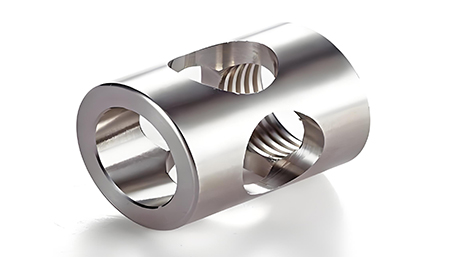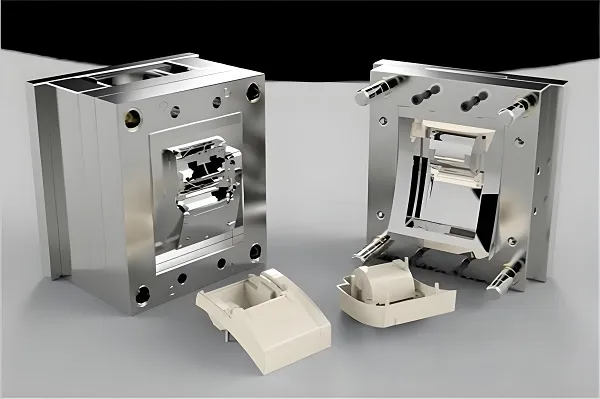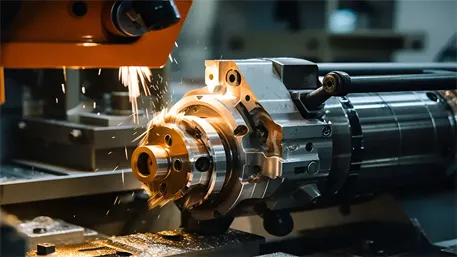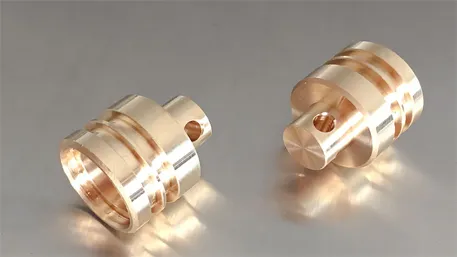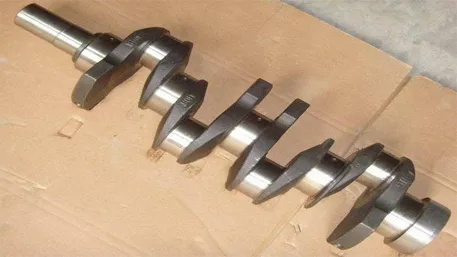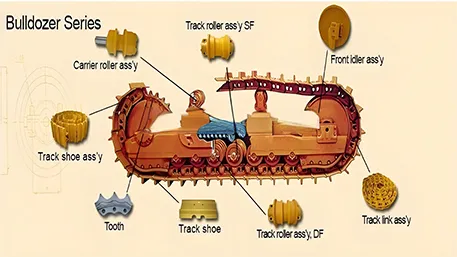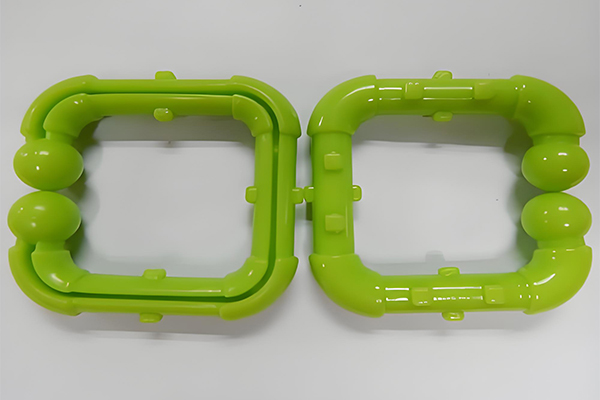In the dynamic world of manufacturing, non – standard mechanical hardware parts play a pivotal role in enabling the creation of innovative, high – performance products. From the intricate components in aerospace equipment to the specialized parts in industrial machinery, these custom – made parts are the building blocks that drive progress. As industries strive for greater precision, efficiency, and functionality, CNC (Computer Numerical Control) machining has emerged as the go – to solution for producing custom non – standard mechanical hardware parts. This article will explore the technical prowess, customization process, material selection, quality control, and industry applications of these precision – crafted components.
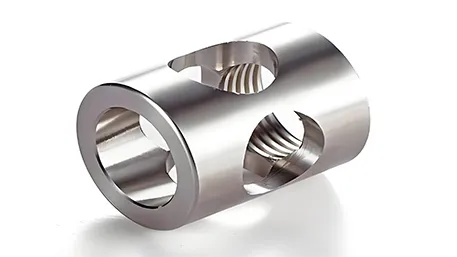
I. Technical Superiority: Precision at Its Finest
(A) Unparalleled Machining Accuracy
CNC machining systems are engineered to deliver exceptional precision. With positioning accuracy reaching ±0.005mm and repeat positioning accuracy of ±0.01mm, we can fabricate non – standard parts with extremely tight tolerances. For example, in the production of micro – components for medical devices, critical dimensions such as hole diameters and wall thicknesses can be maintained within ±0.005mm. This level of accuracy is crucial for ensuring proper fit, functionality, and performance of the assembled products.
(B) Complex Geometry Machining
Five – axis CNC machining technology empowers us to bring the most complex design concepts to life. Whether it’s parts with intricate contours, internal cavities, or multi – angled features, the five – axis system can machine these geometries in a single setup. Compared to traditional machining methods that often require multiple setups and are prone to errors, five – axis CNC machining reduces setup – related errors from ±0.03mm to within ±0.01mm. This not only improves the accuracy of the final product but also significantly boosts production efficiency by over 60%, shortening lead times.
(C) Advanced Process Optimization
During the machining of non – standard mechanical hardware parts, challenges such as material deformation, surface finish, and tool wear need to be addressed. We deploy a suite of advanced techniques to overcome these challenges. By carefully selecting cutting parameters, optimizing toolpaths, and implementing real – time monitoring and control systems, we can minimize material deformation. Additionally, the use of high – speed machining and advanced finishing processes results in parts with a superior surface finish, reducing friction and enhancing the lifespan of the components.
II. End – to – End Customization: Tailoring Parts to Your Exact Specifications
(A) In – Depth Requirement Gathering and Design Collaboration
When you approach us with your non – standard part requirements, our experienced engineering team engages in detailed discussions to understand your application, performance expectations, and design preferences. We work closely with you to translate your ideas into actionable design concepts using state – of – the – art CAD/CAM software. Multiple design iterations are carried out in collaboration with you until the design perfectly aligns with your vision.
(B) Strategic Material Selection and Cost Analysis
Based on the finalized design, we recommend the most suitable materials considering factors such as mechanical properties, corrosion resistance, and cost – effectiveness. We have a wide range of materials at our disposal, including various grades of steel, aluminum, titanium, and plastics. Simultaneously, we conduct a comprehensive cost analysis, factoring in material costs, machining complexity, and production volume, to provide you with a transparent and competitive quote.
(C) Precision Manufacturing and Order Tracking
Once you approve the design and quote, production commences. You can track the progress of your order in real – time through our dedicated online tracking platform. Our skilled technicians follow strict manufacturing standards and use advanced CNC machines to produce parts that meet the highest quality benchmarks.
(D) Rigorous Quality Assurance and Timely Delivery
After production, each non – standard part undergoes a rigorous quality inspection. Only parts that meet our exacting standards are shipped to you. We also offer comprehensive after – sales support, addressing any concerns you may have during the product’s lifecycle.
III. Strategic Material Selection: Choosing the Right Material for the Job
(A) Steel Alloys: Versatile and Strong
Steel alloys, such as 4140 and 1045, are widely used in the production of non – standard mechanical hardware parts. 4140 steel, with its high strength and good machinability, is suitable for applications where mechanical strength is crucial, such as in automotive components and industrial machinery. 1045 steel, on the other hand, offers a good balance of strength and cost – effectiveness, making it ideal for general – purpose applications.
(B) Aluminum Alloys: Lightweight and Corrosion – Resistant
Aluminum alloys, like 6061 and 7075, are popular choices for applications where weight reduction is a priority, such as in aerospace and automotive industries. 6061 aluminum alloy has good corrosion resistance and machinability, while 7075 aluminum alloy offers high strength – to – weight ratio, making it suitable for high – performance applications.
(C) Titanium Alloys: High – Performance and Biocompatible
Titanium alloys, such as Ti – 6Al – 4V, are known for their high strength, corrosion resistance, and biocompatibility. They are used in applications where parts need to withstand extreme conditions, such as in aerospace, medical implants, and chemical processing equipment.
(D) Engineering Plastics: Cost – Effective and Versatile
Engineering plastics, like PEEK (Polyetheretherketone) and nylon, are used in applications where lightweight, corrosion resistance, and electrical insulation are required. PEEK, with its high – temperature resistance and excellent mechanical properties, is often used in high – performance applications, while nylon is a more cost – effective option for general – purpose applications.
IV. Stringent Quality Control: Ensuring Top – Notch Quality
(A) Raw Material Inspection
All incoming raw materials are subject to strict quality checks. We use spectroscopic analysis to verify the chemical composition of metals, ensuring that they meet the required standards. For plastics, we conduct tests to ensure their mechanical and physical properties are as specified. Additionally, hardness testing, tensile testing, and metallographic analysis are performed on metal materials to confirm their integrity.
(B) In – Process Monitoring
Throughout the manufacturing process, we employ statistical process control (SPC) techniques to monitor key manufacturing parameters. Regular sampling and data collection help us identify and correct any potential issues promptly, ensuring consistent product quality.
(C) Final Product Validation
Before shipping, each non – standard part undergoes a comprehensive inspection. We use coordinate measuring machines (CMMs) to verify dimensional accuracy, ensuring that all critical dimensions are within ±0.005mm. Surface roughness is also measured to ensure it meets the specified requirements. In addition, we perform mechanical and functional tests to validate the part’s performance.
V. Diverse Industry Applications: Empowering Multiple Sectors
(A) Aerospace Industry
In the aerospace industry, custom CNC – machined non – standard parts are used in aircraft engines, landing gear systems, and flight control mechanisms. These parts need to meet the highest standards of precision, strength, and reliability to ensure the safety and performance of aircraft.
(B) Automotive Industry
In the automotive industry, non – standard parts are used in engines, transmissions, and suspension systems. Custom – made parts can improve the performance, fuel efficiency, and durability of vehicles, giving automotive manufacturers a competitive edge.
(C) Medical Device Industry
In the medical device industry, custom non – standard parts are used in surgical instruments, diagnostic equipment, and implantable devices. These parts need to be biocompatible, precise, and reliable to ensure the safety and effectiveness of medical treatments.
(D) Industrial Machinery
In industrial machinery, non – standard parts are used to optimize the performance of equipment. Custom – made parts can improve the efficiency, productivity, and lifespan of industrial machinery, reducing maintenance costs and downtime.
VI. Frequently Asked Questions (FAQ)
(A) What is the typical precision of custom CNC – machined non – standard parts?
Our CNC machining can achieve a dimensional tolerance of ±0.005mm, ensuring a precise fit for your applications.
(B) How do I choose the right material for my non – standard parts?
The choice depends on your application’s requirements. Consider factors such as mechanical properties, corrosion resistance, weight, and cost. Our team can provide expert advice on material selection based on your specific needs.
(C) What is the lead time for custom non – standard parts?
Lead times vary depending on the complexity of the design and order quantity. Simple designs can be completed in 3 – 5 days, while more complex ones may take 7 – 10 days. Rush orders are available upon request.
(D) Can CNC machining handle complex non – standard part designs?
Absolutely. Our five – axis CNC machines can fabricate parts with intricate geometries, meeting even the most demanding design requirements.
(E) How much does it cost to customize non – standard mechanical hardware parts?
Costs are determined by factors such as material, design complexity, precision requirements, and order quantity. While small – batch customization may be relatively costly, economies of scale can significantly reduce per – unit costs for larger orders.
VII. Customer Testimonials
An aerospace company approached us to develop custom non – standard parts for a new aircraft engine. Our team used five – axis CNC machining to achieve the required precision of ±0.005mm. The parts not only met the strict quality standards of the aerospace industry but also improved the performance of the engine. As a result, the company was able to launch their new aircraft model ahead of schedule.
A medical device manufacturer needed custom non – standard parts for a new surgical instrument. We implemented advanced machining techniques and rigorous quality control measures to ensure that the parts met the highest medical standards. The customer reported increased product reliability and reduced returns.
Reach Out Now for Your Custom CNC – Machined Non – Standard Mechanical Hardware Parts!
Regardless of your industry or application, our team of experts is ready to collaborate with you. We offer a seamless end – to – end service, from design to delivery. Contact us today to discuss your project requirements and take the first step towards getting top – quality custom non – standard mechanical hardware parts.
